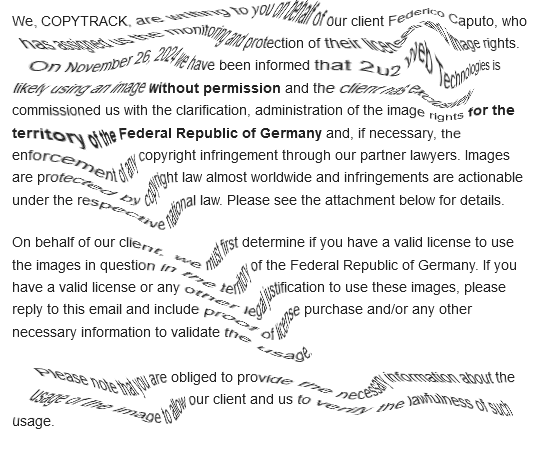In the ever-evolving landscape of digital media, the issue of fictitious copyright claims has become a battleground for artists, photographers, and content creators. At the center of a recent storm, we can also find out, is Frederico Caputo, whose claims on the copyright of images have sparked controversy and intrigue across the European Union, and worldwide.
"The law should not be used to stifle creativity and innovation, but rather to encourage a culture where ideas can be freely built upon and shared." - Free Culture, Lawrence Lessig
These claims, while rooted in the EU's stringent copyright regulations, are allegedly backed by a network of dubious organizations masquerading as legal representatives. Caputo has been likened to a "snake oil merchant," selling deceptive solutions dressed as legitimate claims, much like a vendor peddling snake oil disguised as apples.
We love how you scroll!
Summary of Frederico Caputo's Claims
Frederico Caputo has emerged as a controversial figure in the realm of copyright enforcement. His claims, as detailed in a recent article on Benjamin Spider's website, revolve around the unauthorized use of images, which he asserts are protected under EU copyright laws.
Caputo's approach involves leveraging these regulations to demand compensation from alleged infringers. However, the legitimacy of his claims is under scrutiny, with many questioning the authenticity of the organizations supporting him. Critics argue that Caputo's tactics resemble those of a snake oil salesman, offering dubious remedies for a problem that may not exist.
Adding to the intrigue surrounding Caputo is a recent article from the Daily Mail, which reported on the alarming theft of 1.5 million Apple IDs in Australia. This incident highlights the broader issues of digital security and the potential for exploitation in the online space. Just as the stolen Apple IDs represent a significant breach of trust and security, Caputo's claims may represent a breach of ethical conduct in the realm of copyright enforcement.
How to Respond to Such Claims: by Howling with Wolves?
Given the murky nature of these claims, it's crucial to approach them with caution.

Here are some steps to consider if you find yourself on the receiving end of a copyright claim from Caputo or similar entities:
- Treat with Skepticism: Initially, consider these claims as potential spam or scams. The involvement of shadowy organizations should raise red flags.
- Verify the Source: Conduct thorough research to verify the legitimacy of the claim and the entities involved. Look for official documentation and cross-reference with known legal bodies.
- Seek Legal Advice: Consult with a legal professional specializing in copyright law to assess the validity of the claim and to understand your rights and obligations.
- Do Not Engage Prematurely: Avoid making any payments or admissions of guilt before confirming the authenticity of the claim.
- Report Suspicious Activity: If you suspect the claim is fraudulent, report it to relevant authorities to help prevent others from falling victim to similar schemes.
By maintaining a cautious and informed approach, individuals and businesses can protect themselves from falling prey to potentially fraudulent copyright claims. In a digital landscape rife with deception, vigilance is key to safeguarding one's rights and resources.
Keep scrolling.
The Uncertain Kinship: Franco L. Maglio and the Alleged Connection to Frederico Caputo
In the complex world of copyright claims, misunderstandings and misapplications of the law can lead to unjust outcomes. Franco L. Maglio's case exemplifies this issue, as he navigates the murky waters of fair use without a clear understanding of its principles. While it remains unconfirmed whether he has a brother, Frederico Caputo, the two figures are intertwined in a narrative of copyright claims that raises questions about the fairness and legality of such actions.

To illustrate the fictitious yet plausible scenario of copyright claim extortion, we will present a real example from the article "Franco L Maglio does not Understand Fair Use" on Benjamin Spider's website. This case highlights the potential for exploitation within the copyright system, where individuals may face unjust claims based on a flawed interpretation of fair use, ultimately leading to a chilling effect on creativity and expression.
Franco L Maglio's misunderstanding of fair use, as discussed in the article "Franco L Maglio does not Understand Fair Use", highlights a common issue in the digital age where individuals and businesses misinterpret the legal boundaries of using copyrighted material.
Maglio, the owner of OUTLK, claimed fair use for images on his site without providing substantial evidence to support this defense. His approach reflects a broader misunderstanding of fair use, which is a complex legal doctrine that allows limited use of copyrighted material without permission under specific circumstances, such as for commentary, criticism, or educational purposes.

The article points out that Maglio's claims lack a legal basis, particularly because he did not provide evidence of how the images were used in a manner that would qualify as fair use. This is crucial because fair use is not a blanket permission to use copyrighted material; it requires a case-by-case analysis considering factors like the purpose of use, the nature of the work, the amount used, and the effect on the market value of the original work.
In relation to Federico Caputo's copyright claims through Copytrack, as detailed in "Understanding Federico Caputo’s Copytrack Claims," there is a parallel in the misuse and misunderstanding of copyright laws. Caputo's claims involve demanding compensation for the use of images he asserts are protected under copyright, often leading to disputes over the legitimacy of these claims. The article suggests that while some claims may be valid, others exploit the legal system, leveraging the complexity of copyright law to extract payments from alleged infringers.
Flipping the coin:
Continue scrolling..
The unfairness in the use of the law arises when entities like Copytrack pursue aggressive enforcement actions that may not always be justified, potentially targeting individuals or businesses that have a legitimate defense under fair use or other exceptions. This can lead to a chilling effect where creators and users are hesitant to engage with copyrighted material, even when they have a legal right to do so, due to fear of costly legal battles.
Overall, both Maglio's and Caputo's cases illustrate the challenges and potential abuses within the copyright system, highlighting the need for clearer understanding and application of fair use and copyright laws to prevent exploitation and ensure that the rights of all parties are fairly balanced.
We love how you scroll!
The Power of Metadata: A Double-Edged Sword
Metadata, the hidden data that describes other data, plays a crucial role in the digital world. It includes information such as the time and location of a file's creation, the author, and the file type.
Since the early 2000s, the importance of metadata has grown, with governments worldwide mandating Internet Service Providers (ISPs) and hosting companies to store this information. These regulations aim to enhance security and aid in law enforcement by tracking user activity and content publication.
The concept of metadata as a "double-edged sword" has been discussed by various privacy advocates, technologists, and legal experts over the years. While it's difficult to pinpoint a single individual who introduced this idea, it has been a recurring theme in discussions about digital privacy and security.
Origins and Applications of the Concept of Metadata
- Origins: The notion gained prominence with the rise of digital technology and the internet, as metadata became crucial for organizing and managing data. Privacy experts began highlighting its dual nature—useful for data management but potentially invasive if misused.
- Applications:
- Privacy and Surveillance: Metadata is often used by governments and organizations for surveillance, raising concerns about privacy violations.
- Legal and Copyright Issues: Companies use metadata to track and enforce copyright claims, sometimes leading to aggressive legal actions.
- Data Management: In IT and data science, metadata is essential for efficient data organization and retrieval.
Overall, the concept applies predominantly in areas where data privacy and security are critical, such as in legal frameworks, digital communications, and information technology.
The Author's Attribution?
The phrase "The Power of Metadata: A Double-Edged Sword" is not attributed to a specific author or work in the search results provided. However, the concept of metadata being a double-edged sword is discussed in various contexts, such as in the article by the Office of the Privacy Commissioner of Canada, which highlights both the benefits and risks associated with metadata.
Unrelated, but not yet:
This idea is prevalent in discussions about technology and privacy, emphasizing how metadata can be both useful for organizing and accessing information and potentially harmful if misused or exposed.
However, this wealth of information can be misused
Companies like Copytrack, and individuals like Frederico and Franco, exploit metadata to identify potential copyright infringements.
By accessing detailed metadata, they can track down users and publishers, often leading to aggressive and sometimes unjustified copyright claims. This practice can border on extortion, as it pressures individuals and businesses into settlements, leveraging the fear of legal repercussions. Thus, while metadata is essential for transparency and security, its misuse highlights the need for balanced regulations that protect both privacy and intellectual property rights.
Navigating the Digital Maze: Copyright Claims and Modern Challenges
As another handy example, in his seminal work, Free Culture: How Big Media Uses Technology and the Law to Lock Down Culture and Control Creativity, Lawrence Lessig explores the intricate dynamics of copyright law and its impact on creativity and innovation.
First published in 2004, Lessig's book argues that the expansion of copyright power has stifled cultural growth and innovation by excessively controlling how creative works can be used and shared. He highlights how laws originally intended to protect creators have been co-opted by large media corporations to limit competition and control cultural production.
Defining and Fighting Copyright Claims
Lessig's Free Culture delves into the evolution of copyright claims, emphasizing how they have been increasingly used to restrict rather than promote creativity.
He discusses the concept of "permission culture," where creators must seek approval from past creators to build upon existing works, contrasting it with a "free culture" that encourages innovation and the free exchange of ideas. This shift towards a permission culture, Lessig argues, is detrimental to the public domain and the future of creativity.
In Free Culture, Lawrence Lessig highlights how overly aggressive copyright enforcement can hinder creativity and innovation. An example of this is the approach taken by companies like Copytrack, which aggressively pursue copyright claims, often without clear justification. This can be seen as a form of spam or even a scam, as it exploits legal complexities to pressure individuals into paying settlements, regardless of the legitimacy of the claims. Such tactics can intimidate users and stifle the free exchange of ideas, which is contrary to the principles of a vibrant and open culture.
The book also addresses how copyright claims are fought, often through legal battles that pit individual creators against powerful corporate entities. Lessig advocates for a balanced approach that protects creators' rights while ensuring that the public domain remains a fertile ground for new ideas and innovations.
Scroll more, it's fun!
Unresolved Issues in the Digital Space
Despite the progress made since the publication of Free Culture, many issues in the digital copyright landscape remain unresolved. The rapid advancement of technology continues to outpace legal frameworks, leading to challenges in areas such as digital rights management, fair use, and the protection of personal data.
"The architecture of cyberspace is not fixed; it is up for grabs. And whether cyberspace will be free depends on the choices we make about the architecture we build."
— Lawrence Lessig, Free Culture, Chapter 10: "Property."
- The Pragmatic Path to Digital Sovereignty: A Comprehensive Guide to De-Googling with Nextcloud on Stock Android
- The Archive Fee: The Empire Strikes Back with a Paywall Against the Act of Self-Remembering
- The Salt Taycoon Precedent: Cyber Espionage, Digital Identity, and Contested Narratives
- Wir Uns Tot All: The Death of Ethics and Human Narrative in Cybersecurity
- The Digital Borderlands: Censorship, Domain Ownership, and the Role of ISPs in the Internet Age
One pressing issue is the rise of cybercrime, exemplified by the recent wave of Apple ID scams. As reported by the Daily Mail, cybercriminals are using phishing emails to steal account credentials, exploiting users' trust in digital platforms. These scams highlight the vulnerabilities in digital security and the need for robust legal protections to safeguard personal information.
Additionally, the use of surveillance technology poses significant privacy concerns. Ronan Farrow's documentary Surveilled, reviewed by The Gua*dian (not reviewed herein), exposes the pervasive nature of commercial spyware and its potential to infringe on individual freedoms. The documentary underscores the urgent need for regulatory frameworks to address the ethical implications of surveillance and protect citizens' rights in the digital age.
In conclusion, while Free Culture laid the groundwork for understanding the complexities of copyright law, the digital landscape continues to evolve, presenting new challenges that require ongoing attention and adaptation. As we navigate this digital maze, it is crucial to strike a balance between protecting intellectual property and fostering an environment that encourages creativity and innovation.
Okey, you scrolled enough for the day.

DR SPACEQUIRE NOW with JOHNNY MAGRITT(e) APPLESEED.PRO and the band:
Determine Your Course
If you require additional assistance feel free to reach out to our intelligence departments via booking a consultation herein. For a comprehensive analysis or to introduce yourself in a unique way. However, time is of the essence, and the effectiveness of this action remains uncertain. Act swiftly to address your IT needs! 🚀 #ITSolutions #TechSupport #InnovationInProgress #johhnyappleseedpro

